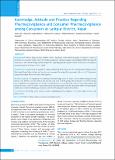Please use this identifier to cite or link to this item:
https://hdl.handle.net/20.500.14356/1619Full metadata record
| DC Field | Value | Language |
|---|---|---|
| dc.contributor.author | Jha, Nisha | - |
| dc.contributor.author | DRathore, Devendra Singh | - |
| dc.contributor.author | Shankar, Pathiyil Ravi | - |
| dc.contributor.author | Bhandary, Shital | - |
| dc.contributor.author | Alshakka, Mohammed | - |
| dc.contributor.author | Gyawali, Sudesh | - |
| dc.date.accessioned | 2023-05-16T10:10:12Z | - |
| dc.date.available | 2023-05-16T10:10:12Z | - |
| dc.date.issued | 2017 | - |
| dc.identifier.citation | JhaN., RathoreD. S., ShankarP. R., BhandaryS., AlshakkaM., & GyawaliS. (2017). Knowledge, Attitude and Practice Regarding Pharmacovigilance and Consumer Pharmacovigilance among Consumers at Lalitpur District, Nepal. Journal of Nepal Health Research Council, 15(1). https://doi.org/10.33314/jnhrc.v15i1.968 | en_US |
| dc.identifier.issn | Print ISSN: 1727-5482; Online ISSN: 1999-6217 | - |
| dc.identifier.uri | http://103.69.126.140:8080/handle/20.500.14356/1619 | - |
| dc.description | Original Article | en_US |
| dc.description.abstract | Abstract Background: Adverse drug reactions (ADRs) can be a big threat to the health of people in Nepal as a variety of medicines are consumed in the country. Involving consumers in pharmacovigilance can strengthen ADR reporting. The study aims to find out knowledge, attitude and practice regarding pharmacovigilance and consumer pharmacovigilance among consumers at Lalitpur district, Nepal Methods: It was carried out in outpatients visiting in KIST Medical College and Teaching Hospital, Lalitpur, Nepal. Participant’s knowledge, attitude and practice were measured by noting their agreement with a set of 21 statements along with multiple choice and open ended questions. Results: A total of 157 outpatients were surveyed. The knowledge scores for males (12) was better compared to the females (11), but the scores for attitude and practice were same for both groups. The maximum score for knowledge was 29, attitude was 6 and practice was 10. The overall KAP scores was 45. The total scores for knowledge, attitude and practice for males (24) were better compared to female (22) respondents. Seventy-one patients (68%) who participated in this study favoured establishing a consumer centre for obtaining information about ADRs. Conclusions: Knowledge scores among consumers regarding pharmacovigilance is low and require advocacy and improvement. Keywords: Adverse drug reaction; consumers; reporting systems. | en_US |
| dc.language.iso | en | en_US |
| dc.publisher | Nepal Health Research Council | en_US |
| dc.relation.ispartofseries | Jan-April, 2017;968 | - |
| dc.subject | Adverse drug reaction | en_US |
| dc.subject | Consumers | en_US |
| dc.subject | Reporting systems | en_US |
| dc.title | Knowledge, Attitude and Practice Regarding Pharmacovigilance and Consumer Pharmacovigilance among Consumers at Lalitpur District, Nepal | en_US |
| dc.type | Journal Article | en_US |
| local.journal.category | Original Article | - |
| Appears in Collections: | Vol. 15 No. 1 Issue 35 Jan-Apr 2017 | |
Files in This Item:
| File | Description | Size | Format | |
|---|---|---|---|---|
| 968-Manuscript-1869-1-10-20170608.pdf | Fulltext Download | 176.95 kB | Adobe PDF |  View/Open |
Items in DSpace are protected by copyright, with all rights reserved, unless otherwise indicated.
